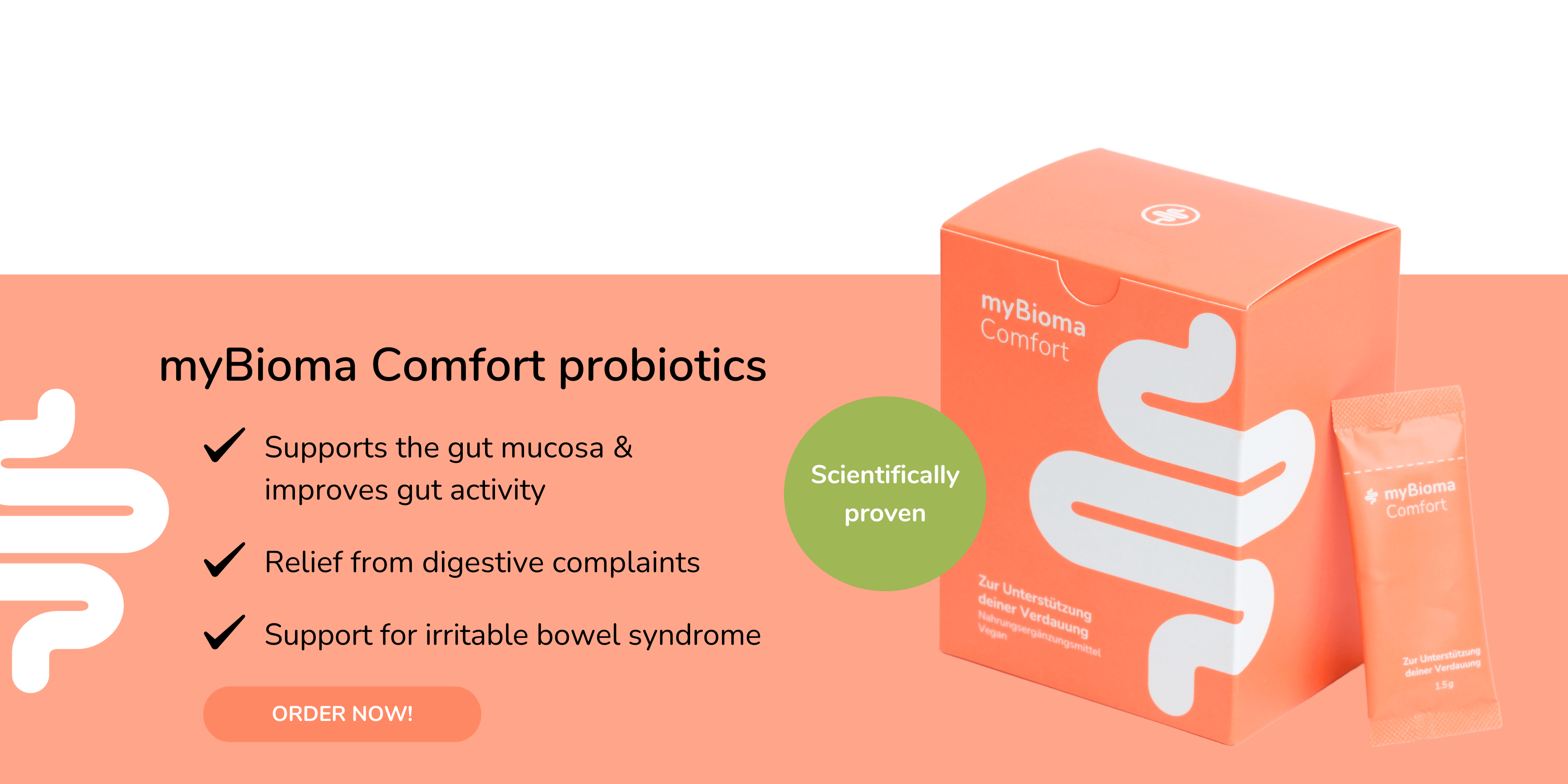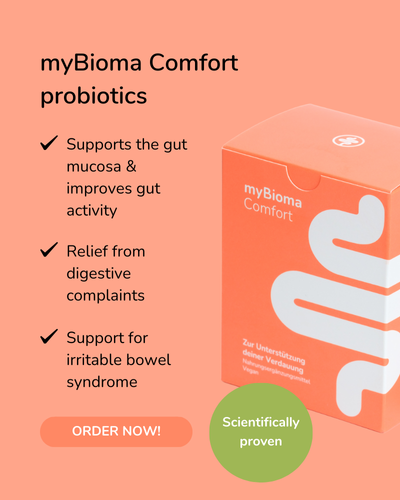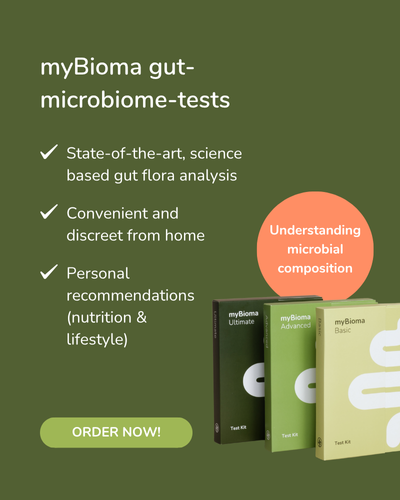Paleo, vegan, gluten-free, FODMAP, no red meat… – if you’re reading this, you’re probably looking for a healthy diet . But how are you supposed to know your way around these tons of dietary restrictions? There is also the latest trend : the intestinal flora, i.e. the bacteria in the intestine , is now part of the vocabulary of the nutrition-conscious person. This huge collection of bacteria (also called the microbiome) has a particular influence on health and disease . For a balanced microbiome, nothing is more important than the right diet. But what exactly do our little roommates actually need to feel comfortable? We'll show you in four simple steps how to keep your intestinal flora healthy!
1. Green, greener, greenest
Our intestinal flora thrives particularly well when it consists of as many different species as possible - i.e. when there are many different bacteria in it! This Diversity helps us to utilize our food particularly well and is very important for the well-being of our body. High diversity has been reported in numerous studies Health associated with low diversity, however, with many diseases. The motto is to build a microbiome that is as diverse as possible! This is best achieved with one diverse diet that includes many different fibers or roughage. Exactly these fiber are found primarily in Vegetables, whole grains and fruits . Due to evolution, we humans are omnivores and should be used to plenty Plant to eat. Unfortunately, the daily diet in western countries no longer looks like this and our microbiome - our intestinal flora - has also become quite monotonous. But what hundreds of years ago was healthy for us, it still is today. Indigenous peoples who live away from any civilization continue to eat a variety of plants and plants fiber materials . Due to this variety of food, their intestinal flora also has a much higher diversity (1).
Vegetables should play a much more central role in our daily meals as it has an incredible amount of fiber to offer. But it's not just the quantity that matters, but also the different types . Tomatoes, peppers, cucumber and lettuce - these are probably the average vegetables that make it onto our plates. In principle there is nothing wrong with these types of vegetables, but they are far from sufficient to nurture a diverse microbiome. Rather, varieties should be served alternately. broccoli, lentils , Chard, radishes , chickpeas, beets and chicory – these are just a few of the varieties we focus on regularly forgotten . The more different types of vegetables and greens on our plates, the better for our intestinal flora. Because it needs more and more different employees for the many different fiber materials! On the new one There is really something to the “plant-based diet” food trend , i.e. viewing plants as a basic building block of the daily diet. In the supermarket - or even better at the farmers market - get away from them Seasonal vegetables be inspired and something new take home. Don't serve the usual rice and salad with the normal natural schnitzel, but instead prepare three newly discovered vegetables and potatoes (they also have more fiber than rice)!
Of course it is too Fruit very valuable for us. However, you should prefer vegetables to fruits as they are even richer in fiber and less Sugar contains. But of course crunchy apples, berries, bananas and many other types of fruit make for a balanced diet Breakfast or a wonderful snack Addition .
2. Take a look!
Yes, whole grain bread, I've heard that before... “ Whole grain products ” – that sounds so healthy and more of a second choice. But stop! Who thinks they know everything about whole grain bread and would rather avoid it than enjoyment connects, he was really wrong. Because a good wholemeal bread is cooked not dry , mushy and definitely doesn't have a boring taste! A wonderful wholemeal roll made from spelled and rye has a lot to offer fuller, nuttier taste than an everyday roll. Whole grain stays fresh longer and goes wonderfully with many spreads, ham, hummus or salad. But whole grain products not only impress in terms of taste, they also prevail in many other ways. Whole grains last you a lot Fuller for longer than conventional baked goods, because of the fiber There are a lot of carbohydrates in the intestines digested more slowly and enter the blood more evenly. With a normal slice of white bread, it doesn't take long for your intestines to break everything down and put the former flour in form of sugar is washed into the blood. Then you are full for a short while, but only until all the sugar is taken out of the blood (with the help of insulin). Whole grain bread, on the other hand, is digested longer in the intestine with the help of intestinal bacteria and lasts longer blood sugar like this for a long time on one person constants Level. Come through this fewer hunger pangs and Craving sweets and you stay more focused on the matter. (2)
For your Intestinal flora Whole grain products are a special treat! With all this fiber you feed your microbiome and give it a lot of work! Of course, this is not just limited to whole grain bread, but also in many other areas Replace regular flour with whole wheat . Unfortunately, we access them far too rarely Whole grain pasta , whole grain couscous or unsweetened Whole grain mueslis – yes, whole grain is the exception and “normal” white flour is the rule. If you want to do something good for yourself and your microbiome, you should reverse this rule and eat whole grains daily menu make!
3. Leave the work to others
It's not just the bacteria in your intestines that can help you digestion but also some of the countless bacteria that live outside your body. Probably the oldest form of food preservation uses: Lactic acid bacteria (Lactobacilli). These break down fibers and carbohydrates - the process is called Fermentation . The bacteria make the food durable and easier to digest. Of that we benefit in two ways: on the one hand, they become valuable food components only available to us, on the other hand, are fermented foods probiotic . The latter means that there are live bacteria in the food and they get into our intestines. These probiotics are one special addition for our intestinal flora and are the focus of many studies. There is evidence that probiotics benefit people with Irritable bowel syndrome and mental illnesses such as anxiety disorders, or simply Concentration and memory can improve. Probiotics are also being tested in other areas, such as medication, and their effects are being investigated in studies. (3)
Taking probiotics through your diet is another way to care for your intestinal flora. But which foods are fermented? Traditional fermented dishes include the classic sauerkraut, kimchi (Korean fermented Chinese cabbage), miso or kombucha. Plus there is plenty fermented milk products , including yogurt, kefir and curd. However, there are a few things to consider when purchasing fermented foods. Sauerkraut or kimchi You should always buy on tap (the best place to find this is at the farmers market). This way you can be sure that it has actually been fermented. The packaged sauerkraut from the supermarket was fermented, but unfortunately it becomes so pasteurized and this kills all lactobacilli. If you want to be on the safe side, you can also use sauerkraut and many other vegetables ferment yourself. When it comes to fermented milk products, it is also important to remember that yoghurts are produced industrially with only a single strain of bacteria and are therefore not the most exciting probiotics for the intestines. It is therefore advisable to alternate types of natural yoghurt because different manufacturers use different bacteria - or, even better, to buy yoghurt directly from the farmers' market.

Fermented foods are part of my daily diet - not just because they are healthy due to their probiotic effect, but because they taste real Treats are! Yoghurt for breakfast and sauerkraut are regularly served in salads (with pumpkin seed oil).
4. The hidden villains
Now we have looked at what your intestinal flora can support. But what about things that... harm the intestinal flora could? Although this topic has not yet been well researched, there are ingredients that should be kept in mind. More and more products are being sold in supermarkets preservatives , colorings, Emulsifiers or flavor enhancers added. “But I never eat frozen pizza and don’t buy ready-made products!” - Really? Because these ingredients are not only found in the finished cream schnitzel or the package of chips! Also most in Canned pickled vegetables , yogurts with added fruit and Bakery products from the supermarket have these ingredients. And who doesn't sometimes buy canned beans or apricot yogurt with cornflakes? This Tons of additives could affect the microbiome and the intestinal mucosa and are partly responsible for the increasing occurrence of many Diseases such as inflammatory bowel disease and autoimmune diseases. However, the large-scale studies to test this in detail are still missing.
What does all this mean for you and your microbiome? More conscious deal with products from the supermarket and more often the Description on the back side read through. Of course, not every additive can be avoided, but reducing it is easy! We should also think about our microbiome more often, after all, it also eats with us. Following a strict diet regime is probably not necessary and will not last long-term. Rather, it's about more than that Variety , lots of it Vegetables and fruit, whole grain products and fermented Integrate food into everyday life! Your gut will thank you !
References
- Zmora N, Suez J, Elinav E. You are what you eat: diet, health and the gut microbiota. Nat Rev Gastroenterol Hepatol. 2018
- Aune D, Keum N, Giovannucci E, et al. BMJ. 2016;353:i2716.
- Şanlier N, Gökcen BB, Sezgin AC. Health benefits of fermented foods. Crit Rev Food Sci Nutr. 2017;:1-22.









